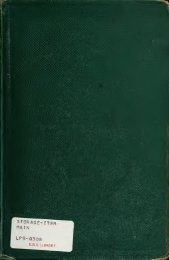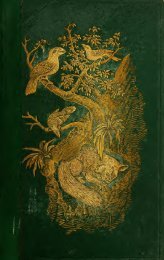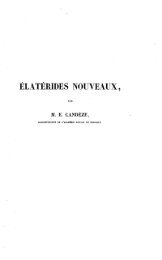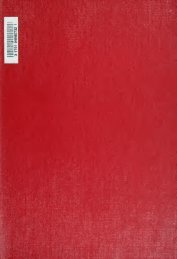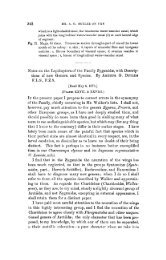- Page 1 and 2:
Wimmm WMMM: mm^. 'Mmm:^ m wmmWmmH^^
- Page 8 and 9:
THE GEOGRAPHICAL DISTRIBUTION OF AN
- Page 10 and 11:
?e\Tc£ coWcc^iOr^ l^^? Access. ncx
- Page 12 and 13:
CONTENTS OF THE SECOND VOLUME. CHAP
- Page 14 and 15:
CONTENTS OF THE SECOND VOLUME. CHAP
- Page 17:
THE GEOGRAPHICAL DISTRIBUTION OF AN
- Page 21 and 22:
CHAPTER XIV. THE NEOTROPICAL EEGION
- Page 23 and 24:
CHAP, XIV.] THE NEOTROPICAL REGION.
- Page 25 and 26:
CHAP. XIV.] THE NEOTROPICAL REGION.
- Page 27 and 28:
CHAP. XIV.] THE NEOTROPICAL REGION.
- Page 29 and 30:
CHAP. XIV.] THE NEOTROPICAL REGION.
- Page 31 and 32:
CHAP. XIV.] THE NEOTROPICAL EEQION.
- Page 33 and 34:
CHAP. XIV.] THE NEOTROPICAL REGION.
- Page 35 and 36:
CHAP. XIV.] THE NEOTROPICAL REGION.
- Page 37 and 38:
CHAP. XIV.] THE NEOTROPICAL REGION.
- Page 39 and 40:
CHAP. XIV.] THE NEOTROPICAL EEGION.
- Page 41 and 42:
CHAP. XIV.] THE NEOTROPICAL REGION.
- Page 45 and 46:
CHAP. XIV.] THE NEOTROPICAL REGION.
- Page 47 and 48:
CHAP, xiv.l THE NEOTROPICAL REGION.
- Page 51 and 52:
CHAP. XIV.] THE NEOTROPICAL REGION.
- Page 53 and 54:
CHAP. XIV.] THE NEOTROPICAL REGION.
- Page 55 and 56:
CHAP. XIV.] THE NEOTROPICAL REGION.
- Page 57 and 58:
CHAP. XIV.] THE NEOTROPICAL REGION.
- Page 59 and 60:
CHAP. XIV.] THE NEOTROPICAL REGION.
- Page 61 and 62:
CHAP. XIV.] THE NEOTROPICAL REGION.
- Page 63:
PLATE XVI. THE CHILIAN ANDES, WITH
- Page 66 and 67:
42 ZOOLOGICAL GEOGRAPHY. [pabtiii.
- Page 68 and 69:
44 ZOOLOGICAL GEOGEAPHY. [part hi.
- Page 70 and 71:
46 ZOOLOGICAL GEOGRAPHY. [part in.
- Page 72 and 73:
48 ZOOLOGICAL GEOGRAPHY. [part hi.
- Page 74 and 75:
50 ZOOLOGICAL GEOGRAPHY. [part hi.
- Page 76 and 77:
62 ZOOLOGICAL GEOGRAPHY. [part hi.
- Page 78 and 79:
54 ZOOLOGICAL GEOGRAPHY. [part hi.
- Page 80 and 81:
56 ZOOLOGICAL GEOGRAPHY. [part hi.
- Page 82 and 83:
58 ZOOLOGICAL GEOGRAPHY. [part hi.
- Page 84 and 85:
60 ZOOLOGICAL GEOGKAPHY. [part hi.
- Page 86 and 87:
62 ZOOLOGICAL GEOGRAPHY. [part in.
- Page 88 and 89:
64 ZOOLOGICAL GEOGEAPHY. [part hi.
- Page 90:
66 ZOOLOGICAL GEOGRAPHY. [part m. d
- Page 93 and 94:
CHAP. XIV.] THE NEOTKOPICAL REGION.
- Page 95 and 96:
CHAP. XIV.J THE NEOTEOPICAL REGION.
- Page 97 and 98:
k CHAP. XIV.] THE NEOTROPICAL REGIO
- Page 99 and 100:
CHAP. XIV.] THE NEOTROPICAL REGION.
- Page 101 and 102:
CHAP. XIV.] THE NEOTROPICAL REGION.
- Page 103 and 104:
OHAP, XIV.] THE NEOTROPICAL REGION.
- Page 105 and 106:
CHAP. XIV.] THE NEOTROPICAL REGION.
- Page 107 and 108:
CHAP. XIV.] THE NEOTROPICAL REGION.
- Page 109 and 110:
CHAP. XIV.] THE NEOTROPICAL REGION.
- Page 111 and 112:
CHAP. XIV,] THE NEOTKOPICAL REGION.
- Page 113 and 114:
CHAP. XIV.] THE NEOTROPICAL REGION.
- Page 115 and 116:
CHAP. XIV.] THE NEOTROPICAL REGION.
- Page 117 and 118:
CHAP. XIV.] THE NEOTROPICAL REGION.
- Page 119 and 120:
CHAP. XIV.J THE NEOTROPICAL REGION.
- Page 121 and 122:
CHAP. XIV.J THE NEOTROPICAL REGION.
- Page 123 and 124:
CHAP. XIV. THE NEOTROPICAL REGION.
- Page 125 and 126:
CHAP. XIV.] THE NEOTROPICAL REGION.
- Page 127 and 128:
CHAP. XIV.] THE NEOTROPICAL REGION.
- Page 129 and 130:
CHAP. XIV.] THE NEOTROPICAL REGION.
- Page 131 and 132:
CHAP. XIV.] THE NEOTROPICAL REGION.
- Page 133 and 134:
CHAP. XIV.] THE NEOTROPICAL REGION.
- Page 135 and 136:
CHAP. XIV.] THE NEOTROPICAL REGION.
- Page 137 and 138:
CHAP. XIV.J
- Page 139 and 140:
CHAP. XIV.] THE NEOTEOPICAL REGION.
- Page 142 and 143:
NE ARC TIC REGION Scale 1 inch -1,0
- Page 144 and 145:
— 116 ZOOLOGICAL GEOGRAPHY. [part
- Page 146 and 147:
ZOOLOGICAL GEOGRAPHY. [part III. ma
- Page 148 and 149:
120 ZOOLOGICAL GEOGRAPHY. [part hi.
- Page 150 and 151:
122 ZOOLOGICAL GEOGRAPHY. ' [part h
- Page 152 and 153:
124 ZOOLOGICAL GEOGRAPHY. [part in.
- Page 154 and 155:
126 ZOOLOGICAL GEOGRAPHY. [part hi.
- Page 156 and 157:
128 ZOOLOGICAL GEOGRAPHY. [part hi.
- Page 159 and 160:
CHAF. XV.] THE NEARCTIC REGION. 129
- Page 163 and 164:
CHAP. XV.] THE NEARCTIC REGION. 131
- Page 165 and 166:
CHAP. XV.] THE NEARCTIC REGION. 133
- Page 167 and 168:
CHAK xv.J THE NEARCTIC EEGION. •
- Page 169:
PLATE XX. A CANADIAN FOREST, WITH C
- Page 172 and 173:
138 ZOOLOGICAL GEOGEAPHY. [part hi.
- Page 174 and 175:
140 ZOOLOGICAL GEOGRAPHY. [part III
- Page 176 and 177:
142 ZOOLOGICAL GEOGRAPHY, [part III
- Page 178 and 179:
144 ZOOLOGICAL GEOGRAPHY. [part, hi
- Page 180 and 181:
14G ZOOLOGICAL GEOGRAPHY. fPART III
- Page 182 and 183:
148 ZOOLOGICAL GEOGRAPHY. [part hi.
- Page 184 and 185:
150 ZOOLOGICAL GEOGEAPHY. [part III
- Page 186 and 187:
152 ZOOLOGICAL GEOGRAPHY. [part III
- Page 188 and 189:
CHAPTEE XVI. SUMMARY OF THE PAST CH
- Page 190 and 191:
156 ZOOLOGICAL GEOGEAPHY. [paht hi.
- Page 192 and 193:
158 ZOOLOGICAL GEOGKAPHY. [part iil
- Page 194 and 195:
IGO ZOOLOGICAL GEOGRAPHY. [part hi.
- Page 196 and 197:
162 ZOOLOGICAL GEOGRAPHY. [part hi.
- Page 198 and 199:
164 ZOOLOGICAL GEOGRAPHY. [part ji
- Page 201 and 202:
INTRODUCTION. In the preceding part
- Page 203 and 204:
I INTRODUC] INTRODUCTION. 169 than
- Page 205 and 206:
CHAP, XVII.] MAMMALIA. 171 We have
- Page 207 and 208:
CHAP, xvii.] MAMMALIA. 173 are Myio
- Page 209 and 210:
CHAP. XVII.] MAMMALIA. I75 complete
- Page 211 and 212:
CHAP. XVII.] MAMMALIA. 177 Suh-fami
- Page 213 and 214:
CHAP. XVII.] MAMMALIA- 179 discover
- Page 215 and 216:
CHAP, XVII.] MAMMALIA. 181 Neotropi
- Page 217 and 218:
CHAP. XVII.] MAMMALIA. 183 volume w
- Page 219 and 220:
CHAP. XVII.] MAMMALIA. 185 Molossi
- Page 221 and 222:
CHAP. XVII.] MAMMALIA. 187 single o
- Page 223 and 224:
CHAP. XVII.] MAMMALIA. \m being now
- Page 225 and 226:
CHAP. XVII.] MAMMALIA. 191 and Oste
- Page 227 and 228:
CHAP. XVII.] MAMMALIA. 193 of Madag
- Page 229 and 230:
CHAP. XVII.] MAMMALIA. 195 Genetta
- Page 231 and 232:
CHAP. XVII.] MAMMALIA. 197 Ictither
- Page 233 and 234:
CHAP. XVII.] MAMMALIA. 199 not goin
- Page 235 and 236:
CHAP. XVII.] MAMMALIA. 201 from Cob
- Page 237 and 238:
CHAP. XVII,] MAMMALIA. 203 Southern
- Page 239 and 240:
cfiAP. XVII.] MAMMALIA. 205" Americ
- Page 241 and 242:
CHAP, xvii.] MAMMALIA. 207 Order V.
- Page 243 and 244:
CHAP. XVII. MAMMALIA. 209 in both j
- Page 245 and 246:
CHAP. XVII.] MAMMALIA. 211 Maryland
- Page 247 and 248:
CHAP. XVII.] MAMMALIA. 213 Europe a
- Page 249 and 250:
CHAP, xvii.] MAMMALIA. 215 peccarie
- Page 251 and 252:
CHAP. XVII. J MAMMALIA. 217 of the
- Page 253 and 254:
CHAP, xvii.j MAMMALIA. 219 regions
- Page 255 and 256:
CHAP. XVII.] MAMMALIA. 221 Family 5
- Page 257 and 258:
CHAP. XVII.] Mammalia. 223 a very p
- Page 259 and 260:
CHAP, XVII.] MAMMALIA. 225 The genu
- Page 261 and 262:
CHAP. XVII.] MAMMALIA. 227 the tapi
- Page 263 and 264:
CHAP. XVII.] MAMMxVLIA. 229 last Ca
- Page 265 and 266:
\ CHAP. XVII.j MAMMALIA. 231 an ext
- Page 267 and 268:
CHAP. XVII.] MAMMALIA. 233 Family 5
- Page 269 and 270:
CHAP. XVII.] MAMMALIA. 235 Sciurus
- Page 271 and 272:
CHAP. XVII.] MAMMALIA. 237 Family 6
- Page 273 and 274:
CHAP. XVII.] MAMMALIA. 239 of Panam
- Page 275 and 276:
CHAP. XVII.] MAMMALIA. 241 been fou
- Page 277 and 278:
CHAP. XVII.] MAMMALIA. 243 and Guat
- Page 279 and 280:
— CHAP, XVll,] MAMMALIA. 245 Exii
- Page 281 and 282:
CHAP. XV1I."| MAMMALIA. 247 Family
- Page 283 and 284:
CHAP. XVII.] MAMMALIA. 249 rat-like
- Page 285 and 286:
I CHAP. XVII,] MAMMALIA. 251 The we
- Page 287 and 288:
CHAP, XVIl.l MAMMALIA, 253 The Womb
- Page 289 and 290:
CHAPTEE XVIII. THE DISTRIBUTION OF
- Page 291 and 292:
CHAP, xviii.] BIRDS. 257 This immen
- Page 293 and 294:
CHAP, xviii.] BIRDS. 259 4. Sylviin
- Page 295 and 296:
CHAP, xviii.] BIRDS. 261 Australia
- Page 297 and 298:
CHAP. XVIII.] BIRDS. The Cinclidae
- Page 299 and 300:
CHAP. XVIII.] BIRDS. 265 Europe to
- Page 301 and 302:
CHAP. XVIIl.] BIRDS. 267 The Phyllo
- Page 303 and 304:
CHAP. XVIII.] BIRDS. 2G9 Hebrides,
- Page 305 and 306:
CHAP. XVIII.] BIRDS. 271 Malaya (ex
- Page 307 and 308:
CHAP. XVIII.] BIRDS. 273 The Corvid
- Page 309 and 310:
CHAP, xviii.] BIRDS. 275 Islands ;
- Page 311 and 312:
CHAP. XVIII.] BIRDS. 277 Sula Islan
- Page 313 and 314:
CHAP. XVllI.] BIRDS. 279 They range
- Page 315 and 316:
: CHAP. XVIII.] BIRDS. 281 The Hiru
- Page 317 and 318:
CHAP, xviii.] BIRDS. 283 peculiar t
- Page 319 and 320:
CHAP, xviii.] BIRDS. 286 (13 sp.),
- Page 321 and 322:
CHAP, xviii.] BIRDS. 287 16911695 1
- Page 323 and 324:
CHAP. XVIII,] BIRDS. 289 Family 37.
- Page 325 and 326:
CHAP. XVIII.] BIRDS. 291 Juan Ferna
- Page 327 and 328:
oaAP. xviii.] BIRDS. 293 Family 41
- Page 329 and 330:
CHAP, xviii.] BIRDS. 295 the road t
- Page 331 and 332:
CHAP. XVIII.] BIRDS. 297 Sub-family
- Page 333 and 334:
CHAP. XVIII.l BIRDS. 299 Neotropica
- Page 335 and 336:
CHAP, xviii.] BIRDS. 301 3, the Ori
- Page 337 and 338:
CHAP. XVIII.] BIRDS. 303 its extrem
- Page 339 and 340:
CHAP. XVIII,] BIRDS. 305 Family 54.
- Page 341 and 342:
CHAP. XVIII.] BIRDS. 307 Andigena,
- Page 343 and 344:
CHAP. XVIII.] BIRDS. 309 being to M
- Page 345 and 346:
CHAP. XVIII.] BIRDS. 311 to Bolivia
- Page 347 and 348:
CHAP. XVIII.] BIRDS. 313 Family 64.
- Page 349 and 350:
CHAP. XVIII.] BIRDS. 315 Family 67.
- Page 351 and 352:
CHAP, xviii.] BIRDS. 317 considered
- Page 353 and 354:
CHAP. XVIII.] BIRDS. ai9 Family 72.
- Page 355 and 356:
CHAP. XVllI.] BIRDS. 821 Family 75.
- Page 357 and 358:
CHAP. XVIII.] BIRDS. 323 while no l
- Page 359 and 360:
CHAP. XVIII.] BIRDS. 325 the Philip
- Page 361 and 362:
CHAP. XVIII.] BIRDS. 327 Family 79.
- Page 363 and 364:
CHAP. XVIII.J BIRDS. 329 Family 82.
- Page 365:
CHAP. XVIII.] BIRDS. 331 African Ps
- Page 368 and 369:
334 GEOGRAPHICAL ZOOLOGY. [part iv.
- Page 370 and 371:
336 GEOGRAPHICAL ZOOLOGY. [part it-
- Page 372 and 373:
338 GEOGRAPHICAL ZOOLOGY. [part iv.
- Page 374 and 375:
340 GEOGRAPHICAL ZOOLOGY. [part iv.
- Page 376 and 377:
342 GEOGRAPHICAL ZOOLOGY. [part IV-
- Page 378 and 379:
344 GEOGRAPHICAL ZOOLOGY. [fart iv.
- Page 380 and 381:
346 GEOGRAPHICAL ZOOLOGY. [part IV.
- Page 382 and 383:
348 GEOGRAPHICAL ZOOLOGY. [part iv.
- Page 384 and 385:
850 GEOGRAPHICAL ZOOLOGY. [part iv.
- Page 386 and 387:
352 GEOGRAPHICAL ZOOLOGY. [part iv.
- Page 388 and 389:
354 GEOGRAPHICAL ZOOLOGY. [part IV.
- Page 390 and 391:
356 GEOGRAPHICAL ZOOLOGY. [part IV.
- Page 392 and 393:
358 GEOGRAPHICAL ZOOLOGY. [part IV.
- Page 394 and 395:
360 GEOGRAPHICAL ZOOLOGY. [part IV.
- Page 396 and 397:
362 GEOGRAPHICAL ZOOLOGY. [part iv.
- Page 398 and 399:
364 GEOGRAPHICAL ZOOLOGY. [part IV.
- Page 400 and 401:
'366 GEOGJRAPHICAL ZOOLOaY. [part I
- Page 402 and 403:
368 GEOGRAPHICAL ZOOLOGY. [part IV.
- Page 404 and 405:
370 GEOGRAPHICAL ZOOLOGY. [part iv.
- Page 406 and 407:
CHAPTER XIX. THE DISTRIBUTION OF TH
- Page 408 and 409:
374 GEOGRAPHICAL ZOOLOGY. [part IV.
- Page 410 and 411:
376 GEOGRAPHICAL ZOOLOGY. [part IV.
- Page 412 and 413:
378 GEOGRAPHICAL ZOOLOGY. [part IV.
- Page 414 and 415:
380 GEOGRAPHICAL ZOOLOGY. [part IV.
- Page 416 and 417:
382 GEOGRAPHICAL ZOOLOGY. [part IV.
- Page 418 and 419:
384 GEOGRAPHICAL ZOOLOGY. [part IV.
- Page 420 and 421:
386 GEOGEAPHICAL ZOOLOGY. [part iv.
- Page 422 and 423:
388 GEOGRAPHICAL ZOOLOGY. [part IV.
- Page 424 and 425:
390 GEOGRAPHICAL ZOOLOGY. [part IV.
- Page 426 and 427:
392 GEOGRAPHICAL ZOOLOGY. [part iv.
- Page 428 and 429:
394 GEOGRAPHICAL ZOOLOGY. [part IV.
- Page 430 and 431:
396 GEOGRAPHICAL ZOOLOGY. [part IV.
- Page 432 and 433:
398 GEOGRAPHICAL ZOOLOGY. [part IV,
- Page 434 and 435:
400 GEOGRAPHICAL ZOOLOGY. [pakt iv.
- Page 436 and 437:
402 GEOGRAPHICAL ZOOLOGY. [part iv.
- Page 438 and 439:
404 GEOGRAPHICAL ZOOLOGY. [part iv.
- Page 440 and 441:
406 GEOGRAPHICAL ZOOLOGY. [part IV.
- Page 442 and 443:
, regions 408 GEOGRAPHICAL ZOOLOGY.
- Page 444 and 445:
410 GEOGRAPHICAL ZOOLOGY. [part iv.
- Page 446 and 447:
412 GEOGRAPHICAL ZOOLOGY. [PAET IV.
- Page 448 and 449:
414 GEOGRAPHICAL ZOOLOGY. [part IV.
- Page 450 and 451:
41G GEOGRAPHICAL ZOOLOGY. [part IV,
- Page 452 and 453:
418 GEOGRAPHICAL ZOOLOGY. [part IV
- Page 454 and 455:
420 GEOGRAPHICAL ZOOLOGY. [part IV.
- Page 456 and 457:
422 GEOGRAPHICAL ZOOLOGY. [part iv.
- Page 458 and 459:
CHAPTER XX. THE DISTEIBUTION OF THE
- Page 460 and 461:
42G GEOGRAPHICAL ZOOLOGY. [part iv.
- Page 462 and 463:
428 GEOGRAPHICAL ZOOLOGY. [part iv.
- Page 464 and 465:
430 GEOGRAPHICAL ZOOLOGY. [part iv.
- Page 466 and 467:
432 GEOGRAPHICAL ZOOLOGY. [part iv.
- Page 468 and 469:
434 GEOGRAPHICAL ZOOLOGY. [part iv.
- Page 470 and 471:
436 GEOGRAPHICAL ZOOLOGY. [part iv.
- Page 472 and 473:
438 GEOGRAPHICAL ZOOLOGY. [part iv.
- Page 474 and 475:
440 GEOGRAPHICAL ZOOLOGY. [part iv.
- Page 476 and 477:
442 GEOGRAPHICAL ZOOLOGY. [part iv.
- Page 478 and 479:
444 GEOGRAPHICAL ZOOLOGY. [part iv.
- Page 480 and 481:
446 GEOGRAPHICAL ZOOLOGY. [part iv.
- Page 482 and 483:
448 GEOGRAPHICAL ZOOLOGY. [part iv.
- Page 484 and 485:
450 GEOGRAPHICAL ZOOLOGY. [part iv.
- Page 486 and 487:
452 GEOGRAPHICAL ZOOLOGY. [part iv.
- Page 488 and 489:
454 GEOGRAPHICAL ZOOLOGY. [part iv
- Page 490 and 491:
456 GEOGRAPHICAL ZOOLOGY. [i-abt iv
- Page 492 and 493:
458 GEOGRAPHICAL ZOOLOGY. [part iv.
- Page 494 and 495:
460 GEOGRAPHICAL ZOOLOGY. [part iv.
- Page 496 and 497:
462 GEOGRAPHICAL ZOOLOGY. [part iv
- Page 498 and 499:
464 GEOGKAPHICAL ZOOLOGY. [part iv.
- Page 500 and 501:
466 GEOGRAPHICAL ZOOLOGY. [part iv.
- Page 502 and 503:
CHAPTER XXL THE DISTRIBUTION OF SOM
- Page 504 and 505:
470 GEOGRAPHICAL ZOOLOGY. [part IV.
- Page 506 and 507:
472 GEOGRAPHICAL ZOOLOGY. [PAET IV,
- Page 508 and 509:
474 GEOGRAPHICAL ZOOLOGY. [part iv.
- Page 510 and 511: 476 GEOGKAPHICAL ZOOLOGY. [part IV.
- Page 512 and 513: 478 GEOGRAPHICAL ZOOLOGY. [part IV,
- Page 514 and 515: 480 GEOGRAPHICAL ZOOLOGY. [part IV.
- Page 516 and 517: 482 GEOGRAPHICAL ZOOLOGY. [part iv.
- Page 518 and 519: 484 GEOGRAPHICAL ZOOLOGY. [part iv.
- Page 520 and 521: 486 GEOGKAPHICAL ZOOLOGY. [part iv.
- Page 522 and 523: 488 GEOGRAPHICAL ZOOLOGY. [part iv.
- Page 524 and 525: — — 490 GEOGRAPHICAL ZOOLOGY. [
- Page 526 and 527: 492 GEOGRAPHICAL ZOOLOGY. [part iv.
- Page 528 and 529: 494 GEOGRAPHICAL ZOOLOGY. [part iv.
- Page 530 and 531: 496 GEOGRAPHICAL ZOOLOGY. [part iv.
- Page 532 and 533: 498 GEOGRAPHICAL ZOOLOGY. [part iv.
- Page 534 and 535: 500 GEOGRAPHICAL ZOOLOGY. [part iv.
- Page 536 and 537: 502 GEOGRAPHICAL ZOOLOGY. [part iv.
- Page 538 and 539: CHAPTEE XXII. .\N OUTLINE OF THE GE
- Page 540 and 541: 506 GEOGRAPHICAL ZOOLOGY. [part iv.
- Page 542 and 543: 508 GEOGRAPHICAL ZOOLOGY. [iaut iv.
- Page 544 and 545: 510 GEOGRAPHICAL ZOOLOGY. [part iv
- Page 546 and 547: il2 GEOGRAPHICAL ZOOLOGY. [part iv.
- Page 548 and 549: 514 GEOGRAPHICAL ZOOLOGY. [part it.
- Page 550 and 551: 516 GEOGRAPHICAL ZOOLOGY. [part iv.
- Page 552 and 553: 518 GEOGRAPHICAL ZOOLOGY. [part IV.
- Page 554 and 555: 620 GEOGRAPHICAL ZOOLOGY. [part iv.
- Page 556 and 557: 522 GEOGEAPHICAL ZOOLOGY. [part IV.
- Page 558 and 559: 524 GEOGRAPHICAL ZOOLOGY. [part iv.
- Page 562 and 563: 528 GEOGRAPHICAL ZOOLOGY. . to the
- Page 564 and 565: 530 GEOGEAPHICAL ZOOLOGY. [part iv.
- Page 566 and 567: 532 GEOGEAPHICAL ZOOLOGY. [part iv.
- Page 568 and 569: 534 GEOGRAPHICAL ZOOLOGY. [part iv.
- Page 570 and 571: 536 GEOGRAPHICAL ZOOLOGY. [part iv.
- Page 572 and 573: 538 GEOGRAPHICAL ZOOLOGY. [I'ART IV
- Page 574 and 575: CHAPTER XXIII. SUMMARY OF THE DISTR
- Page 576 and 577: 542 GEOGRAPHICAL ZOOLOGY. [part iv.
- Page 578 and 579: GU GEOGRAPHICAL ZOOLOGY. ' [part iv
- Page 580 and 581: 546 GEOGRAPHICAL ZOOLOGY. [part iv.
- Page 582 and 583: 548 GEOGRAPHICAL ZOOLOGY. [part iv.
- Page 584 and 585: 550 GEOGRAPHICAL ZOOLOGY. [part iv.
- Page 586 and 587: 552 GEOGRAPHICAL ZOOLOGY. [part iv.
- Page 589: GENERAL INDEX.
- Page 592 and 593: 558 GENERAL INDEX. Acrcea. ii. 473
- Page 594 and 595: 560 GENERAL INDEX. Anoskmius, ii. 4
- Page 596 and 597: 562 GENERAL INDEX. Baryphthengus, i
- Page 598 and 599: 564 GENERAL INDEX. Bvphaga, ii. 288
- Page 600 and 601: 566 GENERAL INDEX Cave-fauna of Bra
- Page 602 and 603: 568 GENERAL INDEX; CHONDROSTEI, ii.
- Page 604 and 605: 670 GENERAL INDEX. Crypsirhina, ii.
- Page 606 and 607: 572 Dipsadohoa, ii. 379 Dipsas, ii.
- Page 608 and 609: m GENERAL INDEX. Ereptodon, N. Amen
- Page 610 and 611:
576" GENERAL INDEX, Fishes, remarks
- Page 612 and 613:
570 Giinther, Dr., on range of Indi
- Page 614 and 615:
580 Hortulia, ii. 381 GENERAL INDEX
- Page 616 and 617:
582 GENERAL INDEX. Islands, Fiji, T
- Page 618 and 619:
384 GENERAL INDEX. Leucocyon, ii. 1
- Page 620 and 621:
586 Mammalia, of Madagascar, i. 272
- Page 622 and 623:
Migration of animals, general remar
- Page 624 and 625:
590 Neotropical region, fresh-water
- Page 626 and 627:
592 GENERAL INDEX. Otaria, European
- Page 628 and 629:
594 GENERAL INDEX. Persia, birds of
- Page 630 and 631:
596 Pogonostoma, ii. 487 Pogonotric
- Page 632 and 633:
598 GENERAL INDEX. PYRAMIDELLIDiE,
- Page 634 and 635:
600 GENERAL INDEX. Salvin, Mr. , on
- Page 636 and 637:
602 GENERAL INDEX. Spelerpes, ii. 4
- Page 638 and 639:
604 GENERAL INDEX. Testudo, great a
- Page 640 and 641:
606 Ungvlata, Indian Miocene, i. 12
- Page 643 and 644:
WALLACE'S MALAY ARCHIPELAGO. THE MA
- Page 649:
BOSTON UNIVERSITY 1 17n Dllbb 1032







